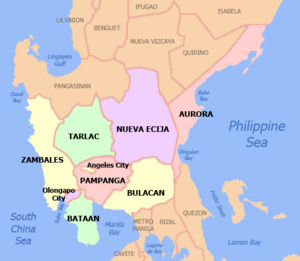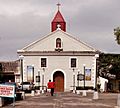Central Luzon facts for kids
Quick facts for kids Region III |
|
| Central Luzon | |
| Region | |
| Nickname: Rice Granary of the Philippines | |
| Population | 10,137,737 |
|---|---|
Central Luzon (also called Region III) is a very important part of Luzon, the largest island in the Philippines. It is known as the "Rice Granary of the Philippines" because it produces most of the country's rice. This region has the biggest plain in the country, which is perfect for farming.
Central Luzon is made up of seven provinces: Aurora, Bataan, Bulacan, Nueva Ecija, Pampanga, Tarlac, and Zambales.
Contents
About Central Luzon
Central Luzon is located just north of Manila, which is the capital city of the Philippines. To its north, you'll find the Ilocos, Cordillera Administrative Region, and Cagayan Valley regions. To the south, it borders Metro Manila, Calabarzon, and Manila Bay. The South China Sea is to its west, and the Philippine Sea is to its east.
This region has fourteen important cities. These include:
- Balanga in Bataan
- Malolos, Meycauayan, and San Jose del Monte in Bulacan
- Cabanatuan, Gapan, Muñoz, Palayan, and San Jose in Nueva Ecija
- Angeles, Mabalacat, and San Fernando in Pampanga
- Tarlac in Tarlac
- Olongapo in Zambales
The City of San Fernando in Pampanga is the main center of the region. It's where many regional government offices are located.
Aurora province used to be part of a different region. It was moved to Central Luzon by a special government order called Executive Order No. 103.
Religions in Central Luzon
Most people in Central Luzon follow the Roman Catholic faith. In 2000, about 86.9% of the people were Roman Catholic.
Other religions practiced in the region include Iglesia ni Cristo, Aglipayan, Evangelicals, United Methodist, Jehovah's Witnesses, Seventh-day Adventist, and United Church of Christ in the Philippines. There are also smaller groups of other faiths.
Political Divisions
Central Luzon is divided into different parts to help manage it. It has:
- 7 provinces
- 14 cities
- 116 municipalities (smaller towns)
- 3,102 barangays (the smallest local government units)
Among its fourteen cities, San Jose del Monte has the largest population. Meycauayan is the most crowded city in the region, meaning many people live close together. Tarlac City is the biggest city when you look at its land area.
Images for kids
See also
 In Spanish: Luzón Central para niños
In Spanish: Luzón Central para niños
 | Emma Amos |
 | Edward Mitchell Bannister |
 | Larry D. Alexander |
 | Ernie Barnes |








